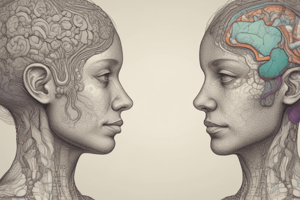Podcast
Questions and Answers
What does the ACE model primarily address in trait development?
What does the ACE model primarily address in trait development?
- The influence of educational systems on personality.
- The role of socioeconomic status in career choices.
- The psychological effects of natural predispositions.
- The interaction between genetic and environmental factors. (correct)
Which of the following statements accurately reflects a finding regarding socioeconomic differences?
Which of the following statements accurately reflects a finding regarding socioeconomic differences?
- Education correlates with higher IQs, but pre-existing IQ is significant. (correct)
- Family wealth has no link to academic success.
- Deprivation has little impact on developmental constraints.
- Higher education and income are unrelated to IQ scores.
What is understood by gene-environment interactions?
What is understood by gene-environment interactions?
- Genes can influence not only traits but also environment selection. (correct)
- Traits are entirely influenced by external circumstances.
- Genes do not affect how individuals select their environments.
- Strong environmental factors overshadow genetic predispositions.
What is a major factor in personality dynamics that distinguishes short-term from long-term changes?
What is a major factor in personality dynamics that distinguishes short-term from long-term changes?
Which aspect does the Standard Social Science Model emphasize in trait development?
Which aspect does the Standard Social Science Model emphasize in trait development?
What can the deprivation indicated in the content lead to in terms of development?
What can the deprivation indicated in the content lead to in terms of development?
What are 'characteristic adaptations' according to the Five Factor Theory?
What are 'characteristic adaptations' according to the Five Factor Theory?
Which statement about shared environments is accurate?
Which statement about shared environments is accurate?
Flashcards
Nature
Nature
The influence of genetic factors on individual characteristics, like behavior and personality.
Nurture
Nurture
The impact of environmental factors, including upbringing and experiences, on individual traits.
ACE Model
ACE Model
A model that explains trait development by analyzing the contributions of genetic, shared environmental, and unique environmental factors.
Shared Environment
Shared Environment
Signup and view all the flashcards
Standard Social Science Model
Standard Social Science Model
Signup and view all the flashcards
Gene-environment Interactions
Gene-environment Interactions
Signup and view all the flashcards
Gene-environment Correlations
Gene-environment Correlations
Signup and view all the flashcards
Testing Shared Environments
Testing Shared Environments
Signup and view all the flashcards
Study Notes
Nature vs. Nurture Debate
- Nature refers to genetic factors influencing trait development.
- Nurture refers to environmental factors influencing trait development.
- Both nature and nurture interact to shape traits, including behavior, emotions, and attitudes.
ACE Model of Trait Development
- A (Additive Genetic Variance): Represents the contribution of genes.
- C (Common Environment Variance): Reflects shared environmental influences like family and parenting styles.
- E (Environmental Variance): Indicates unique environmental factors, like social experiences and measurement errors.
Standard Social Science Model (SSSM)
- Focuses on environmental causes and outcomes.
- Criticized for overlooking the role of genetics, potentially leading to confounds between exposure to environmental factors and outcomes.
Environmental Influences on Development
- Deprivation: Lack of material and social resources, exposure to stress, significantly hinder development.
- Socioeconomic Differences: Family wealth correlates with academic achievement, and education positively influences IQ; however, pre-existing IQ is also a significant factor.
- Limited Evidence on Experiential Influence: Some environmental factors, like daycare, may be associated with increased aggression, but confounding factors are present.
Active Role in Development
- Gene-Environment Interactions: Genes influence how individuals choose and interact with their environment.
- Higher IQ individuals may pursue higher education.
- More extroverted individuals may seek more social interaction.
- Gene-Environment Correlations: Genes and environments interact and influence each other heritably.
Personality Dynamics
- Short-Term: Personality traits can fluctuate.
- Long-Term: Personality changes occur (both normative and individual differences) with a tendency towards stability.
Five Factor Theory of Personality
- Basic Tendencies: Innate and genetically influenced traits.
- Characteristic Adaptations: Personalized adaptations influenced by the environment.
Shared vs. Non-shared Environments
- Shared Environments: Environmental factors experienced similarly by individuals (e.g., siblings raised together).
- Parenting is a crucial shared environment, but its impact isn’t massive.
- Testing Shared Environments: Studies examine the impact of shared environments on traits, such as in twin studies.
Studying That Suits You
Use AI to generate personalized quizzes and flashcards to suit your learning preferences.




